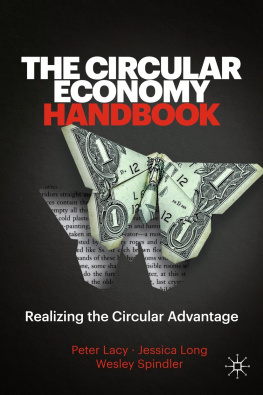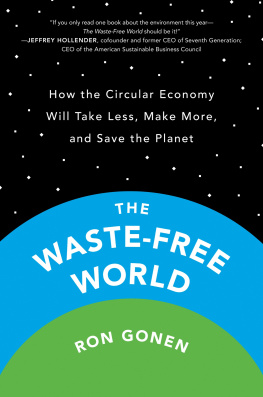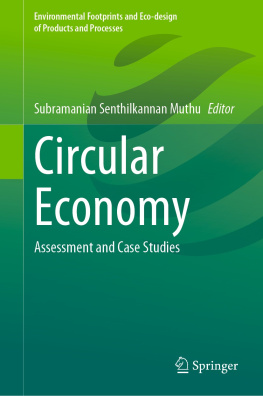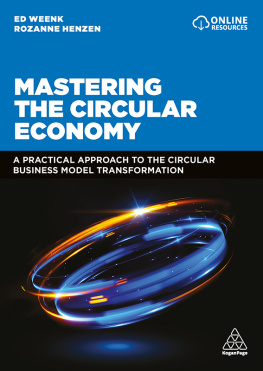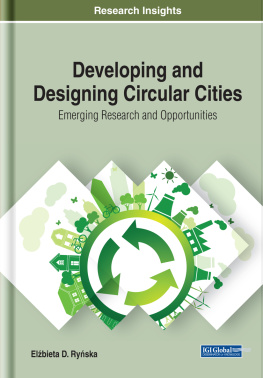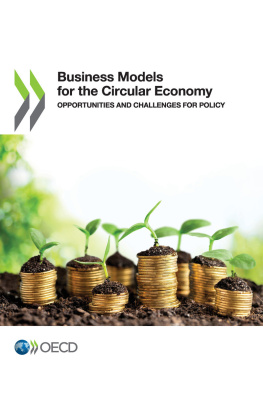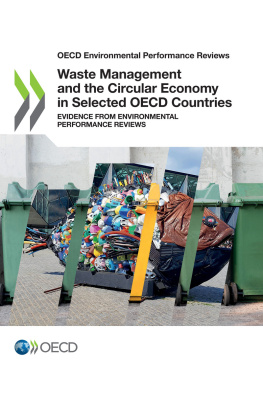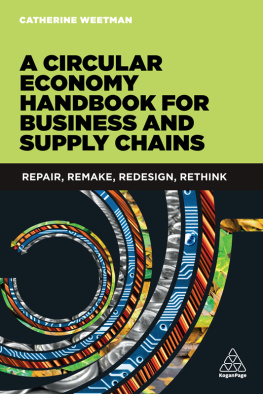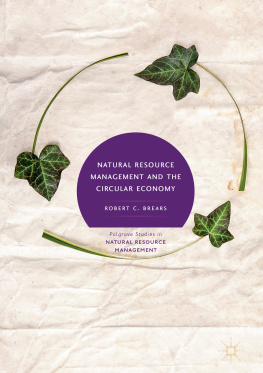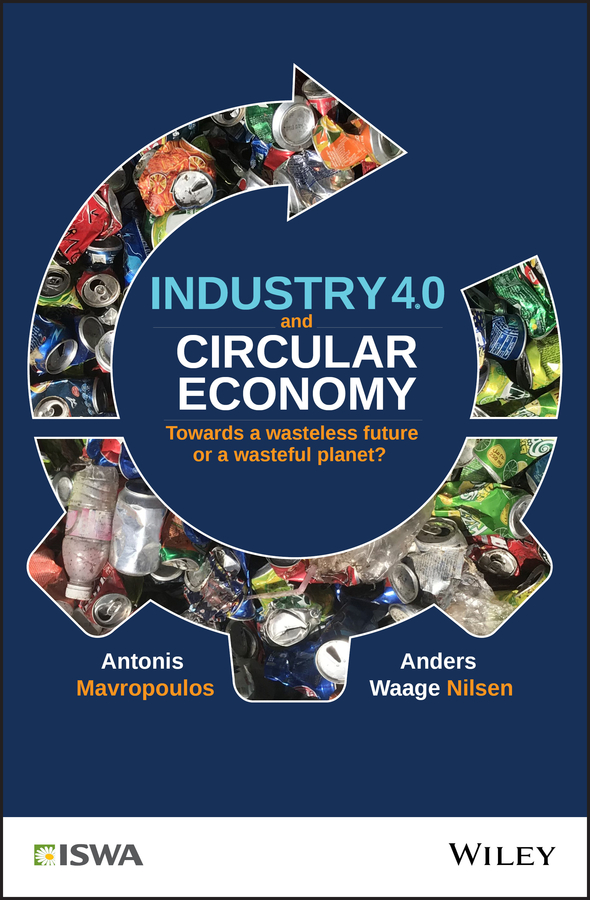
Table of Contents
List of Tables
- Chapter 2
- Chapter 4
- Chapter 5
- Chapter 7
- Chapter 8
List of Illustrations
- Chapter 1
- Chapter 2
- Chapter 3
- Chapter 4
- Chapter 5
- Chapter 6
- Chapter 7
Guide
Pages
INDUSTRY 4.0 AND CIRCULAR ECONOMY
Towards a Wasteless Future or a Wasteful Planet?
ANTONIS MAVROPOULOS
DWASTETM
Athens
Greece
ANDERS WAAGE NILSEN
Bergen
Norway


This edition first published 2020
2020 John Wiley & Sons Ltd
All rights reserved. No part of this publication may be reproduced, stored in a retrieval system, or transmitted, in any form or by any means, electronic, mechanical, photocopying, recording or otherwise, except as permitted by law. Advice on how to obtain permission to reuse material from this title is available at http://www.wiley.com/go/permissions.
The right of Antonis Mavropoulos and Anders Waage Nilsen to be identified as the authors of this work has been asserted in accordance with law.
Registered Offices
John Wiley & Sons, Inc., 111 River Street, Hoboken, NJ 07030, USA
John Wiley & Sons Ltd., The Atrium, Southern Gate, Chichester, West Sussex, PO19 8SQ, UK
Editorial Office
The Atrium, Southern Gate, Chichester, West Sussex, PO19 8SQ, UK
For details of our global editorial offices, customer services, and more information about Wiley products visit us at www.wiley.com.
Wiley also publishes its books in a variety of electronic formats and by printondemand. Some content that appears in standard print versions of this book may not be available in other formats.
Limit of Liability/Disclaimer of Warranty
In view of ongoing research, equipment modifications, changes in governmental regulations, and the constant flow of information relating to the use of experimental reagents, equipment, and devices, the reader is urged to review and evaluate the information provided in the package insert or instructions for each chemical, piece of equipment, reagent, or device for, among other things, any changes in the instructions or indication of usage and for added warnings and precautions. While the publisher and authors have used their best efforts in preparing this work, they make no representations or warranties with respect to the accuracy or completeness of the contents of this work and specifically disclaim all warranties, including without limitation any implied warranties of merchantability or fitness for a particular purpose. No warranty may be created or extended by sales representatives, written sales materials or promotional statements for this work. The fact that an organization, website, or product is referred to in this work as a citation and/or potential source of further information does not mean that the publisher and authors endorse the information or services the organization, website, or product may provide or recommendations it may make. This work is sold with the understanding that the publisher is not engaged in rendering professional services. The advice and strategies contained herein may not be suitable for your situation. You should consult with a specialist where appropriate. Further, readers should be aware that websites listed in this work may have changed or disappeared between when this work was written and when it is read. Neither the publisher nor authors shall be liable for any loss of profit or any other commercial damages, including but not limited to special, incidental, consequential, or other damages.
Library of Congress CataloginginPublication Data
Names: Mavropoulos, Antonis, author. | Nilsen, Anders Waage, 1975 author.
Title: Industry 4.0 and circular economy : towards a wasteless future or a wasteful planet? / Antonis Mavropoulos, Anders Waage Nilsen.
Other titles: Industy four point zero and circular economy
Description: Hoboken, NJ : Wiley, 2020. | Includes bibliographical references and index.
Identifiers: LCCN 2020018139 (print) | LCCN 2020018140 (ebook) | ISBN 9781119699279 (cloth) | ISBN 9781119699286 (adobe pdf) | ISBN 9781119699330 (epub)
Subjects: LCSH: Sustainable development. | Technological innovationsEnvironmental aspects. | Salvage (Waste, etc.) | Human ecology.
Classification: LCC HC79.E5 M565 2020 (print) | LCC HC79.E5 (ebook) | DDC 338.9/27dc23
LC record available at https://lccn.loc.gov/2020018139
LC ebook record available at https://lccn.loc.gov/2020018140
Cover Design: Nikolaos Rigas, DWaste
Cover Image: Nikolaos Rigas, DWaste
Foreword by Ad Lansink
TOWARDS SOCIAL CIRCULARITY
Is it really a hard choice between a wasteless future and a wasteful planet? The question mark behind the subtitle of Industry 4.0 and Circular Economy, the comprehensive and fascinating book of Antonis Mavropoulos and Anders Waage Nilsen, shows that a straightforward answer is difficult. The same is valid for defining circular economy. The question mark gives room for further consideration, looking for a sustainable road to circularity, at the same time addressing the issues of global warming, resources scarcity, and biodiversity losses. The large economic differences between rich and poor countries also require a consistent policy. Until 2020, globalization was a main topic for economy and, often as a counterpart, ecology. Trade and transport became issues for politicians and policy makers, developing treaties to defuse tensions and barriers. Since the international community is going through turbulent times by the outbreak of Covid19 and the grim fight against this pandemic, a social and even cultural component must be added to the paradigm of globalization. 2020 will be referred as a historical year, because of the longterm impact of the Covid19 pandemic. The consequences for the international community will outweigh the effects of previous crises. Therefore, combined efforts on climate policy, circularity, and disease control require a worldwide basis of public support, governance, leadership, and cooperation. Spreading knowledge is as important as sharing responsibilities, both in the field of fundamental research, applied sciences, and practical innovation. International cooperation will be stimulated by new technologies, especially in the implementation of digitalization, networking, and tools such as blockchain technology, artificial intelligence, and worldwide communication channels, presenting society a sustainable future. But social aspects such as solidarity, social justice, and human rights are even essential. Inclusive system thinking seems the right way to defeat all challenges.
Talking about challenges: about four decades ago, concerns about scarcity of raw materials and fossil energy besides increasing waste streams brought me to the idea of the waste hierarchy. The original proposal contained five steps: prevention, source separation, postseparation, incineration with energy recovery, and functional landfilling. During legislation, source and postseparation were replaced by product and material reuse. Recycling does not occur in the preference order but is merely a means of facilitating material reuse. So waste hierarchy and circular economy are greater than recycling. Nowadays, the waste hierarchy is a universal model, an essential route map to circularity, otherwise respecting thermodynamic laws. Progress in effective waste management, especially waste prevention and product reuse requires rethinking society as a whole: a tough task due to the habituation to prosperity and freedom of choice. Therefore, action is needed. Abandoning unnecessary items and services should be a key priority. However, that's a difficult task in a marketdriven society. Extending the lifespan of products and (weight) savings of materials are easier to achieve, as is ecodesign with a focus on quantitative prevention, optimal reuse, and highquality recycling. All transitions require a solid basis of support in society. Communication remains an indispensable instrument for increasing environmental awareness, against vested interests and opportunistic media violence. The return of a strong environmental awareness is necessary to maintain and strengthen public and political support for the transition to a circular economy.
Next page


